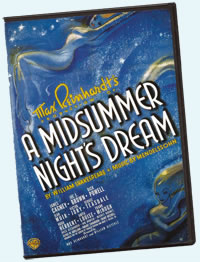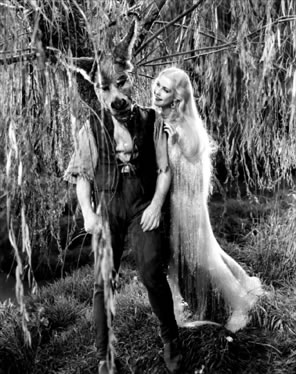A Midsummer Night's Dream
Resurrecting an Unearthly Relic
Warner Brothers (1935), Turner Entertainment (2007)
Directed by Max Reinhardt and William Dieterle. With James Cagney (Bottom), Mickey Rooney (Puck), Olivia de Havilland (Hermia), Dick Powell (Lysander), Joe E. Brown (Flute), Jean Muir (Helena), Victor Jory (Oberon), Anita Louise (Titania).
 Max Reinhardt's 1935 version of A Midsummer Night's Dream holds a historical place in Shakespearean cinema and provides a fun peek into Hollywood's mid-'30s culture. But almost four score years on, does this notoriously lavish and much-maligned movie have any real value as Shakespeare?
Max Reinhardt's 1935 version of A Midsummer Night's Dream holds a historical place in Shakespearean cinema and provides a fun peek into Hollywood's mid-'30s culture. But almost four score years on, does this notoriously lavish and much-maligned movie have any real value as Shakespeare?
Absolutely. This Dream contains a couple of refreshingly apt character readings, in spite of—or maybe because of—witless performances. It also makes for a great drinking game. Shakespeare should be fun, and Reinhardt's movie can generate lots of fun when viewed with a group of friends in a Mystery Science Theater frame of mind, treating the film the way the lords in the play treat the rude mechanicals' production of Pyramus and Thisbe.
If nothing else, Reinhardt's Dream is a relic of the kind of Shakespeare that was being staged in the Edwardian era. Shakespeare had been a source for motion pictures since the art form was invented, but this Midsummer Night's Dream represents the first big-budget Hollywood production of The Bard in the talkie era. That it came from Warner Brothers is integral to its curious composition, for that studio was best known for gangster thrillers and romantic musicals (thus, studio-contracted actors such as James Cagney, Mickey Rooney, and Dick Powell play major roles). In the long view, it seems fitting that a studio specializing in such mass-appeal fare would be best suited to do Shakespeare, and do him right.
However, in Depression-era America, Shakespeare was high art and an Old Country import. Warner Brothers wanted to make a prestige film, and the studio not only considered Shakespeare the epitome of prestige, it hired a man who, by Hollywood standards, was the most prestigious theater practitioner of the day. Reinhardt, a visionary who developed the concept of spectacle theater, had staged an elaborate Dream in his native Austria that he reprised at the Hollywood Bowl. Jack Warner saw this show, and his studio hired Reinhardt to replicate the spectacle on film. Reinhardt's movie-making and English-speaking skills were scant, so William Dieterle was brought in to be co-director. What we get is Reinhardt's extravagances combined with Dieterle's technical skills.
This might well have been the Avatar of its time, with such special effects as the titles rippling like water, ground fog turning into fairies, Puck belching the smoke that overcasts the lovers, and Cagney's noggin transitioning werewolf-like into an ass's head. The movie was nominated for a Best Picture Oscar, and it won for Film Editing and Cinematography (Hal Mohr). The former is certainly deserved if only for one of the film's most subtle special effects: Rooney, who plays Puck, broke his leg during production, and his speaking moments are spliced with another boy scrambling around (one of the movie's funniest moments is Puck, clasping the hem of Helena's dress, being dragged along the ground, the smoke obscuring the cart he's riding). As for Mohr, he wasn't nominated; he won on a write-in campaign, testament to the movie's gorgeous texture.
For all that, though, most of the effects look dated now: The goblin musicians with stocking masks for heads, the sparkling layer of sequins covering the lens whenever Oberon appears, the unicorn that is really a Shetland pony wearing a silly hat. But it's the overwrought nature of the production itself that both dates this film and overwhelms Shakespeare's Dream.
The movie clocks in at 142 minutes, including a six-minute overture in which portions of Felix Mendelssohn's incidental music for Midsummer Night's Dream plays to a static drawing. However, Reinhardt cut out more than half of Shakespeare's dialogue. In its place are long sequences of nonsensical "ballet." Bronislava Nijinska (the famous choreographer's sister) was brought in to stage the dancing, yet it's mostly just herds of women, children, and batmen prancing about and swaying their arms. Five minutes belong to a balletic substory about a first fairy who doesn't want to leave as day dawns. Long musical interludes set Shakespeare's verse to various Mendelssohn compositions, fairies frolic and warble incessantly, and Oberon with a cape the size of Delaware takes an interminably long time to descend to the bower where Titania sleeps. The opening scenes of Theseus' triumphant entrance into Rome, er, Athens is DeMille in scope and Met Opera in execution. The townsfolk, in medieval dress, break into anthemic singing, and throughout this cacophonic chorus we are introduced to spunky Hermia, pathetic Helena, lovable Lysander, eye-rolling Demetrius (the boys are part of Theseus' returning legion, er, army), Hermia's easy-to-fool father, and those madcap mechanicals.
The one good thing to be said about the cuts to Shakespeare's text is that fewer of his lines get butchered by the cast. Anita Louise as Titania speaks like a Hungarian Betty Boop. Victor Jory as Oberon intones Shakespeare's verse like an oxygen pump in intensive care. From the moment he utters his first famous line, "Ill met by moonlight, proud Titania," you begin dreading the even more famous "I know a bank" speech still to come; it arrives with all the poetry of a concrete wall. Jean Muir plays Helena with such pathetic woe—she treats every line as if it's her last utterance before she swallows poison—that only the strongest of love potions could get any man to even like her a little. Shakespeare doesn't tell us how long Demetrius "made love" to Helena, but with Muir's Helena it couldn't have been more than five minutes.
Mickey Rooney handles the verse a bit better than the others, but his Puck nevertheless can get your teeth grinding. Some critics loved the energy and verve the young teenager brought to the part, but every time he laughs it touches my soul like fingernails scraping a chalkboard. That happens a lot, because the woodland portion of the movie is viewed under Puck's ever-watchful eyes. Want a drinking game? Set it to every time Puck laughs; just establish beforehand that nobody playing this game will drive home afterward, though you likely will pass out before the movie's intermission.
Of all the casting incongruities of this production, Cagney as Bottom is the strangest of all. He took a beating from critics on both sides: fans who felt he was overreaching, Shakespeareans who felt he didn't fit their perceptions of the clownish oaf. Cagney may have been out of his element here, but he grounded his performance in an interesting observation; he saw Bottom as the ultimate ham, so he plays him that way, and his Pyramus, at least, is fun to watch. Otherwise it's an ill-fitting performance, though as a career perspective it serves as a kind of transition role for Cagney, from the little tough-guy gangster for which he initially became famous to his Oscar-winning turn as George M. Cohen.
Cagney's ultimate fault is one he shares with the other mechanicals: They don't trust Shakespeare. Fearing, it seems, that their characters aren't funny as written, they overwork the humor instead of riding on Shakespeare's richly comic vein. Cagney's Bottom is an excessive ham, Frank McHugh's Quince throws temper tantrums to excess, Hugh Herbert's Snout giggles excessively, and Joe E. Brown's Flute is such a seed-chewing simpleton that Forrest Gump seems a Rhodes Scholar next to him.
Dick Powell as Lysander and Ross Alexander as Demetrius reportedly knew they were in over their heads, as well, but whether or not they regarded their participation as a lark, they played their parts in that manner, relying on their comic instincts and trusting the script they were given. They thus turn in the movie's best Shakespearean performances, and any cluelessness they may have had about their lines translates into a naïve innocence in their characters, Powell's especially. He plays Lysander with harmless charm, and if some of the things he says seem to surprise him, it's just the magic potion at work. His Lysander has been totally smitten with Hermia, so watching him under the spell regard the sleeping girl with a scrunched-up face as if he were sniffing five-month-old milk is the best Lysander in transition I've ever seen.
The movie also offers up some other interesting interpretations, though they are not textual. The changeling boy, whom Shakespeare merely mentions as the source of conflict between Oberon and Titania, is the center of Titania's attention in the film—until the love potion causes her to dote on Bottom. She literally pushes the changeling away from her, and after she removes the crown of flowers from the boy's head and places it over one of Bottom's ears, the crying changeling is swept away by a banshee-laughing Oberon. When next we see the boy, he is quite happy, riding with Oberon and, like the king of the fairies, now sporting twiggy antlers. Also extratextual is Philostrate (Hobart Cavanaugh) turning away the rude mechanicals after the wedding; but when he approaches Theseus with the scrolls of entertainment options, Puck sneaks in and substitutes that of Pyramus and Thisbe for the one Philostrate is about to hand the duke.
Another interesting reading, which has basis in the text, is that of Verree Teasdale as Hippolyta. "Hippolyta, I wooed you with my sword, and won your love doing you injuries," says Theseus (Ian Hunter) as the film's opening line (thee and thy changed to you and your). She does, indeed, look like she's been physically wounded. The conquered Amazonian appears thoroughly pissed as Theseus brings her into Athens in triumph, even casting a smirk at her enforced-upon fiancé as he receives the people's accolades. The play's actual first line comes later when we see Hippolyta in the palace in deep contemplation. Theseus approaches, and his touch causes her to wince. "Now, fair Hippolyta, our nuptial hour draws on apace," he says. She, though, holds up her hand in a "give me a little time and space, please" gesture, and it is in this attitude she speaks her reply that "four days will quickly steep themselves in nights, four nights will quickly dream away the time." This passage's final line, "the night of our solemnities," Teasdale's Hippolyta delivers in resignation. She does warm to Theseus by the end, though, as Ian Hunter (imported from Britain and one of two actors in the cast with Shakespearean bona fides) plays him as unremittingly benevolent.

Titania (Anita Louise) seduces Bottom (James Cagney) in Max Reinhardt's 1935 film A Midsummer Night's Dream.. Reinhardt had real trees trucked in to a huge soundstage, but the lights needed for filming turned all the foilage brown, so the leaves were painted over. Photo courtesy of Dr. Macro's Movie Scans.
Hippolyta also has a snake motif in her wardrobe, which somehow brings me to this movie's erotic undertow. Never mind the undulating fairies and half-naked batmen; it's the Shakespearean characters who display so much sensuality, especially Titania. She snuggles with the changeling boy in a most disconcerting way, and she goes full bore in seducing Bottom. Bottom gets fully into his character of Pyramus courting an uncomfortable Flute's Thisbe during rehearsal. Theseus is having a hard time waiting four days for his wedding, and Lysander and Hermia are all over each other, even in Athens. This possibly makes Hermia's insistence that Lysander sleep apart from her in the woods as much a factor in his change of heart as the flower juice Puck squeezes into his eyes. This Lysander thought he was already rounding third, and Powell plays his confusion-turned-disappointment perfectly.
Hermia is the screen debut of Olivia de Havilland, who not only had done Shakespeare in community theater but played Hermia in Reinhardt's Hollywood Bowl production. In the film, though, she plays the role as an actress trying her darnedest to impress studio heads and directors to cast her in more films; her performance has much dramatic flair, and her line readings have a vaguely old world accent. Still, she knows the nuances of her character, which is full of adoration and fury in warring doses.
The DVD extras are purchase-worthy bonuses. Some are just strange, like de Havilland's screen test (she passed?) and the six cast members in six separate teasers encouraging audiences to see the movie when it's obvious the actors aren't totally sure what movie they actually made for "Professor Reinhardt" (Powell thinks they were in the Forest of Arden). Another teaser involves Brown talking with Pat O'Brien at the studio cafe about Bill Shakespeare's comic genius ("The things William Shakespeare wrote 300 years ago we comedians are still using," Brown says, though he didn't really use Shakespeare's writing in this film). The theatrical trailer identifies Demetrius as "Shakespeare's dashing romantic hero," and an original making-of documentary is pure Hollywood spin, but it at least gives you the mid-'30s context of this production.
The unexpected gem is the 1936 musical short Shake, Mr. Shakespeare in which a producer dreams that Shakespeare's characters come to life and try to reinvent themselves as suitably Hollywood. Hamlet bowls with Yorick's skull and then does this strange, all-limber-limb dance that Justin Timberlake might want to study. Cleopatra suddenly removes her Egyptian robes and becomes one of a three-person acrobatic team (sneers Antony: "There's Cleopatra getting tossed around again"). Romeo and Juliet split up because she switched studios ("Wouldst thou die for me?" Juliet asks, and Romeo replies, "Mine is an undying love").
The commentary track by film historian Scott MacQueen is the true redeeming value of the DVD. MacQueen has studied the play well and points out many of the textual anomalies in the film. But it is his research of studio documents, memos, and memoirs that offer up insights into the production, its performances, and the corporate and artistic politics surrounding the filming and the movie's release. From MacQueen, we learn how Rooney broke his leg and how they filmed around it, that music arranger Erich Wolfgang Korngold was on the set conducting Jory as he spoke the "I know a bank" speech, that Bottom had a wife in early drafts, and that W.C. Fields was the studio's first choice for Bottom. Oh, we can only dream.
Eric Minton
March 14, 2013
Comment: e-mail editorial@shakespeareances.com
Start a discussion in the Bardroom



 Find additional Shakespeareances
Find additional Shakespeareances